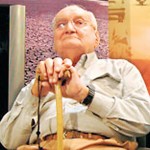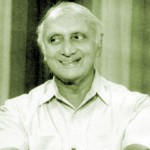Remembering the re-imaginings of two eminent Sri Lankans: Gamani Corea and Ray Wijewardene
These two weeks we will honour the lives of two Sri Lankans who dared re-imagine a different world: a world that was more equal and more sustainable.
Dr. Gamani Corea, best known for being the Secretary General of UNCTAD from 1964-1984, dared to re-imagine a new international world order, which recognised inequality between nations, and advocated for discriminatory or preferential treatment in the world of trade for those lagging behind. Ray Wijewardene, engineer, aviator, inventor and athlete, re-imagined a world where natural resources were used sustainably, and spent much of his life working on sustainable agriculture and renewable energy.

Ray Wijewardene
These two men were born within a year of each other, Mr. Wijewardene in 1924 and Corea in 1925 and both lived well into their 80s. Mr. Wijewardene passed away in 2010, two days before his 86th birthday, and Dr. Corea in 2013, a day before he would have turned 88. Both men belonged to illustrious elitist Sinhala families whose progeny were significant shapers of Sri Lanka’s political and economic history. Both had their secondary education in leading Colombo schools and attended Oxbridge universities.
Both were conferred Sri Lankan honours, Dr. Corea was a Deshamanya and Mr. Wijewardene a Deshamanya Vidya Jothi.
So what was it about these two men that allowed them to re-imagine a different reality, to think and act outside the proverbial box? Dr. Corea has admitted to being influenced heavily by the national freedom struggles in neighbouring India and to reading every writing of Jawaharlal Nehru. In a conversation with Chakravati Raghavan, he explained that it gave him a “perspective” and impelled him to take an interest in politics and development, an interest that underpinned his professional journey from being a conservative economist and central banker to his initial involvement as an expert preparing for the UNCTAD I conference under Raul Prebisch.
Mr. Wijewardene, with his great interest in everything mechanical, had, in the mid 1950s invented the hand held two wheel tractor, which was subsequently manufactured and distributed by Landmaster. Ray travelled around the world promoting the device, but had an epiphany when in the mid 1960s, he was presenting the tractor experience to a class at Harvard Business School, and Buckminster Fuller, a well-known American

Dr. Gamani Corea
architect and inventor asked from the audience: “Did your tractor mechanise tropical farming or just the buffalo?” This question reoriented Ray’s thinking, and as he was later to admit, the tractor did only mechanise the buffalo, and that it neither had the capacity to reproduce nor to produce milk!
The re-imaginings that these events triggered took the two men in a very different direction to where their traditional upbringing and education might have led them, and at this time of commemoration of their lives, we would do well to remind ourselves of what their legacies mean, more broadly for us and for the generations that are to come after us. Their thinking has particular relevance as we contemplate the post-2015 development agenda, and work towards greater equity between and within countries, and prosperity and wellbeing within natural limits.
In a world where the hegemonic hold of a single economic order seems intractable, we need to take courage from the boldness with which Dr. Corea presented the international community with a blueprint for a New International Economic Order; an order, where, based on North-South cooperation, the developing countries of the global south would benefit from a reorientation ofss the international monetary system, from the creation of commodity cartels along the lines of OPEC and the extension of preferential treatment in trade, and from the recognition of developing countries’ permanent sovereignty over their natural resources, including the exploitation of the ocean floor. Dr Corea’s vision was not powerful enough to counteract the intellectual counter-revolution and the fear, among the world economic powers, that a new international economic order would mean dismantling the global market-based economic system. However, even as UNCTAD began to lose its teeth, Dr. Corea determinedly went on to build on the solidarity of the G77 group of countries, and began to call for greater South-South cooperation, via the South Commission and via support to the South Centre, established by Julius Nyerere.
Mr. Wijewardene’s legacy lies in his recognition that prosperity and wellbeing cannot come at the expense of exhausting the planet’s natural capital. A proponent of the ‘green revolution’ when it first happened, Mr. Wijewardene soon began to question the assumptions on which it was based, and advocated for a more sustainable tropical agriculture that adapted the traditional systems. He promoted the Sloping Agricultural Land Technology (SALT), a practice that had been traditional in rain-fed farming in Sri Lanka. SALT involves planting fast-growing nitrogen-fixing plants as double hedgerows on the contours of hills so that the branches can be regularly lopped and mulched to enrich the soil with nitrogen, while the hedgerows prevent the fertile topsoil from being washed or swept away. Mr. Wijewardene was equally well known for his work on renewable energy, which derived from his conviction that a truly independent nation was not dependent on external sources for food, nutrition, health and energy. He was deeply concerned about Sri Lanka’s growing dependence on fossil fuels, its cost in foreign exchange and in the air pollution that came with it. He argued that the dependence on fossilised biomass (which is what coal and oil is) could be broken through the use of biomass that is grown and harvested in the here and now. His meticulous research into Dendro Power and his practical demonstration of its viability at a micro scale, led to its potential for meeting Sri Lanka’s electricity needs being more readily accepted in the nation’s energy mix. Today the country has around 15 dendro plants generating electricity to the grid.
Dr. Corea’s life’s work was a commitment to the equality of nations, and a struggle, in the face of ‘the empire striking back’ to stay true to this commitment, negotiating and looking for alternative opportunities to push existing boundaries. Mr. Wijewardene devoted his energies to the more practical aspects of developing renewable energies and alternate farming practices – sometimes in the face of ridicule. He said “climate change challenges us to rethink all our energy and land use practices – something we should have done years ago”.
Re-imagining a different development path, where no one is left behind and where economic growth takes place within natural limits is not going to be easy. It is likely to meet with resistance, but if we think it is worth doing, it is important, as these two great men have done, to make an unwavering commitment towards getting there.
(The Centre for Poverty Analysis (CEPA) presents “ Reimagining Development as a forum to communicate diverse perspectives on development.” You can engage online via http://reimagining.cepa.lk/index.php/en/
On October 31, 2014 the Government honoured Ray Wijewardene with the issue of a commemorative stamp and on November 3, 2014 the first Gamani Corea memorial lecture was delivered by Dr. Saman Kelegama.)


